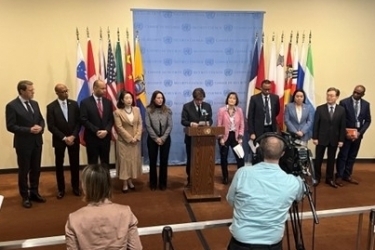気候・平和・安全保障に関する共同プレッジ参加国による西アフリカ及びサヘル地域/UNOWASに関する共同プレスステークアウト
令和6年1月11日

We, the Security Council members that have joined the Joint Pledges related to Climate, Peace and Security - France, Guyana, Japan, Malta, Mozambique, The Republic of Korea, Slovenia, Switzerland, the United Kingdom, and the United States of America - have come together for the first time this year as a group, welcoming the new “Pledgers”. Today the Council convenes to discuss the situation in West Africa and the Sahel and the activities of the UN Regional Office UNOWAS. We express deep concern regarding the severe adverse impacts of climate change on peace and security in West Africa and the Sahel and call for urgent action. To this end, the Pledgers present today have committed to highlight this issue, including during the Council meeting this morning in our national capacities.
In West Africa and the Sahel, climate change and its impacts on peace and security are already a lived reality, especially in the Lake Chad basin or the Liptako-Gourma regions, but also beyond. Increasing frequency and intensity of droughts and floods, biodiversity loss, desertification, and other impacts affect populations who rely mainly on rain-fed agriculture and livestock for subsistence. Climate change amplifies risks of food and water insecurity, loss of livelihoods, migration and displacement that in turn can contribute to competition for resources. These impacts can also fuel violence, including between farmers and herders as well as recruitment into terrorist or violent extremist groups. Women, youth and the most vulnerable communities, are disproportionally affected, and humanitarian needs keep growing. In West Africa, where some 400 million people live, the rapid retreat of the coastline due to rising sea levels is already forcing coastal communities inland. In the Sahel, where agriculture remains the dominant activity, recurrent droughts and increased rainfall variability are leading to more internal migration. Temperatures in the region are set to rise by more than the global average.
Prevention is key. Conflict-sensitive climate adaptation, mitigation, and resilience actions backed by related funding are an important lever for peacebuilding and social cohesion in the sub-region. In this sense, in West Africa, cross-border projects have enabled dialogue and promoted more transparent management of scarce natural resources, transforming the challenges into opportunities as a factor for peace.
We welcome the climate, peace and security work of UNOWAS as it assists the governments in the subregion and the United Nations system in undertaking risk assessments and risk management strategies that take into consideration the adverse implications of climate change, among other factors. UNOWAS works in close collaboration with the Economic Community of West African States (ECOWAS) and its member States, relevant sub-regional fora, such as the recent Sahel Climate Security Forum in Bamako, and civil society - including youth and women’s groups, academia, and UN presences to advance climate, peace and security in West Africa and the Sahel.
We encourage continued collaboration between the AU, ECOWAS and its member states, other subregional fora, and UNOWAS, and relevant UN entities, international financial institutions, the private sector and civil society, including through sustained implementation of the Dakar Call to Action on Climate Change, Peace and Security, and the United Nations Regional Working Group on Climate Change, Environment, Security and Development in West Africa. To inform the Security Council and enable more holistic responses to the impacts of climate change, we reiterate the critical need to further enhance data collection, sharing and analysis as well as early warning systems. The UNOWAS Climate Security Advisor has a unique role in this respect.
